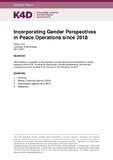| dc.contributor.author | Avis, William | |
| dc.date.accessioned | 2021-12-14T15:13:42Z | |
| dc.date.available | 2021-12-14T15:13:42Z | |
| dc.date.issued | 2021-11-22 | |
| dc.identifier.citation | Avis, W. (2021). Incorporating Gender Perspectives in Peace Operations since 2018. K4D Helpdesk Report No. 1056. Institute of Development Studies, DOI: 10.19088/K4D.2021.143 | en |
| dc.identifier.uri | https://opendocs.ids.ac.uk/opendocs/handle/20.500.12413/17006 | |
| dc.description.abstract | This rapid literature review collates evidence from academic, policy focussed and grey literature on progress on incorporating gender perspectives in peace operations since 2018, including the deployment of female peacekeepers, and the emerging issues in this field.
Key messages that emerge from this review include:
The focus on women’s participation in peace processes has led to several initiatives and efforts to promote increased representation, the multidimensional nature of the UN’s women, peace, and security (WPS) agenda is illustrative of the complexity of contemporary peace operations. The new and emergent issues in National Action Plans (NAP) on Women, Peace and Security. Critiques of Resolution 1325 suggest that while the resolution provides some examples of what a gender perspective means in the context of a peace agreement, it does not define what it means to apply a gender perspective to peace processes.
Gender perspectives are largely absent from peace negotiations. Despite the evolution of this agenda, most contemporary peace processes are still top-down, elite-driven exercises that contribute to marginalisation and exclusion. Whilst there is high-level commitment towards the strategy and what it aims to achieve, institutional barriers, assumptions, and politics undermine its implementation.
Key challenges identified in the literature, related to incorporating Gender Perspectives in Peace Operations include. Buy-in from leadership, Mandate and context, Gender and expertise, Terminology, Under-representation of women in peacekeeping.
Meaningful participation, Gap between norms and provisions, and
Practical/logistical/training issues in implementing the WPS agenda. | en |
| dc.description.sponsorship | FCDO (Foreign, Commonwealth and Development Office) | en |
| dc.language.iso | en | en |
| dc.publisher | Institute of Development Studies | en |
| dc.relation.ispartofseries | K4D Helpdesk Report;1068 | |
| dc.rights.uri | https://www.nationalarchives.gov.uk/doc/open-government-licence/version/3/ | en |
| dc.subject | Health | en |
| dc.title | Incorporating Gender Perspective in Peace Operations since 2018 | en |
| dc.type | Helpdesk | en |
| dc.rights.holder | © Crown copyright 2021 | en |
| dc.identifier.doi | 10.19088/K4D.2021.143 | |
| dcterms.dateAccepted | 2021-11-22 | |
| rioxxterms.funder | Default funder | en |
| rioxxterms.identifier.project | K4D | en |
| rioxxterms.version | VoR | en |
| rioxxterms.versionofrecord | 10.19088/K4D.2021.143 | en |
| rioxxterms.funder.project | 0986883a-6d0f-4bb8-9c46-5e0682934d65 | en |

